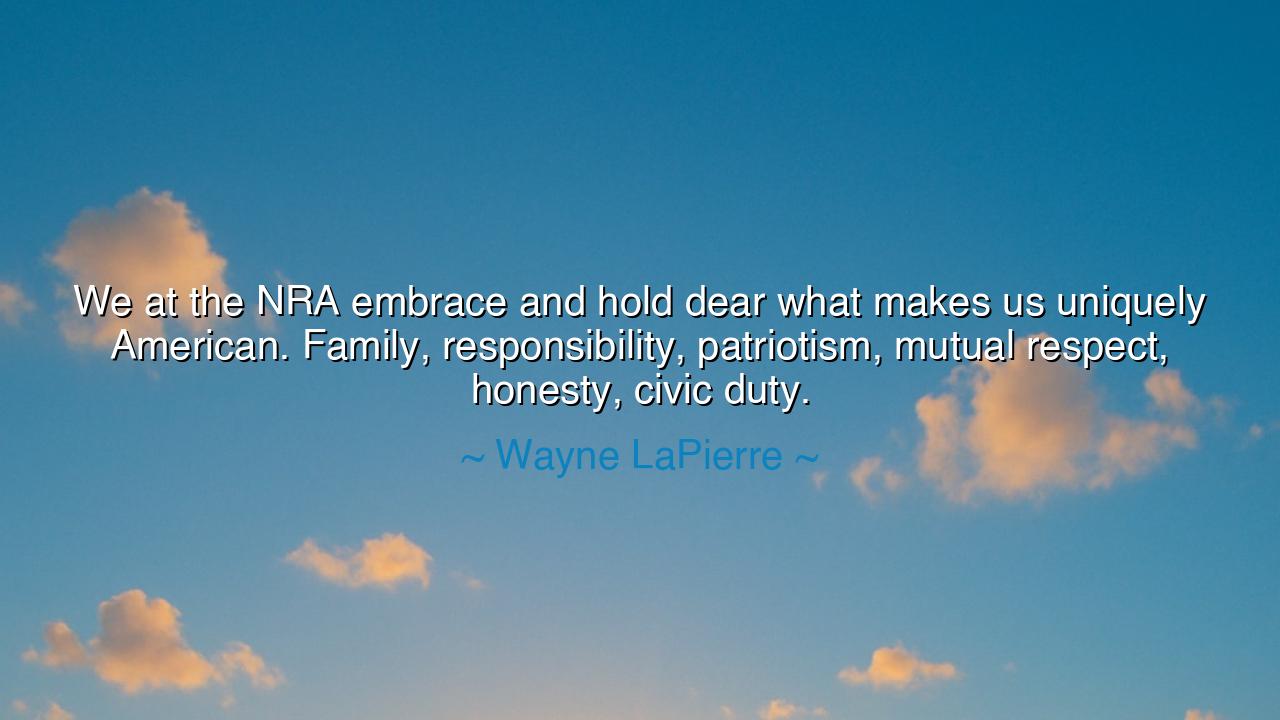
We at the NRA embrace and hold dear what makes us uniquely
We at the NRA embrace and hold dear what makes us uniquely American. Family, responsibility, patriotism, mutual respect, honesty, civic duty.






“We at the NRA embrace and hold dear what makes us uniquely American. Family, responsibility, patriotism, mutual respect, honesty, civic duty.” So speaks Wayne LaPierre, not only to declare the values of an organization, but to remind a people of the pillars upon which a nation must stand. These words are not hollow ornaments; they are the ancient stones of a temple, each one bearing weight, each one essential, without which the structure of freedom collapses.
To speak of family is to speak of the hearth, the first school of the soul. It is within the circle of kin that the virtues of loyalty, sacrifice, and love are planted. The child learns first from the parent how to walk, how to speak, and most importantly, how to belong. Without family, a nation is a crowd, but with it, a nation is a living body, united by bonds deeper than law. The ancients, too, knew this truth: in Rome, the familia was not only blood but the sacred root of society, a covenant that held the Republic together through centuries of trial.
Next comes responsibility, the solemn knowledge that freedom is never license, but duty. To carry rights without bearing duties is to be as a soldier who takes up arms but refuses to defend. Consider George Washington at Valley Forge. In the midst of hunger, cold, and despair, he did not abandon his men. He bore the crushing weight of leadership with silence and endurance. That is responsibility—to carry what is yours, and to carry it even when it breaks your back.
And what of patriotism? It is the fire that compels men and women to place their lives at the altar of their homeland. It is the force that turned farmers at Lexington and Concord into warriors, that drove Clara Barton to the battlefields with bandages and mercy, that has stirred countless unnamed souls to acts of sacrifice. Patriotism is not blind worship of a land, but deep, abiding love for the ideals it stands for—liberty, justice, and hope.
But a nation cannot endure on passion alone. It requires mutual respect and honesty, those humble virtues that oil the gears of daily life. Respect restrains the hand from violence and opens the ear to understanding. Honesty builds trust, without which no covenant, no law, no promise can hold. Recall the tale of Abraham Lincoln walking miles to return a few coins mistakenly given in change. That simple act of honesty foreshadowed the integrity with which he would lead a divided land. Without such virtues, even mighty nations crumble into suspicion and ruin.
Finally, there is civic duty. To live in a republic is not to sit idle and be carried along, but to labor for its preservation. To vote is civic duty. To obey just laws is civic duty. To rise in defense of the weak, to speak truth in public councils, to serve your community—these are the acts that sustain liberty. The ancients of Athens and Rome taught that citizenship was sacred, a trust to be guarded, not a gift to be squandered. So too must we remember: the republic survives only if her sons and daughters choose service over selfishness.
What lesson, then, shall we draw from LaPierre’s proclamation? That to be truly American is not to boast of power or wealth, but to live these six pillars: family, responsibility, patriotism, mutual respect, honesty, civic duty. These are not words to be carved on monuments alone, but practices to be lived each day.
Therefore, let every soul who hears these words act: honor your family with loyalty, shoulder your responsibility without complaint, burn with true patriotism, practice mutual respect, walk in honesty, and fulfill your civic duty. For when these virtues are lived by each citizen, the nation is unshakable. And when they are forgotten, the temple falls. Choose, then, to be a builder, not a destroyer, of your homeland.






AAdministratorAdministrator
Welcome, honored guests. Please leave a comment, we will respond soon